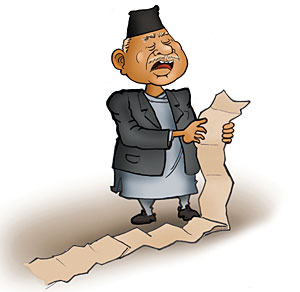 DIWAKAR CHHETRI |
President Ram Baran Yadav read out the government's annual policies and programs to parliament this week. Successive governments since the Panchayat have been used to dishing out platitudes in this annual ritual, and it doesn't seem to matter whether the head of state reading it is an absolute monarch, a constitutional one, or a ceremonial president.
The vacuity of Nepali politics couldn't be more glaring as the opposition couldn't find anything more substantial than the phrase 'People War' to latch on to in the 22-page document. Who cares what it is called, point is it was a people's war because 16,000 people were needlessly killed.
A slightly more substantial critique of the policy paper came from the private sector. One can understand their misgivings because the document doesn't back a full-blown market economy. But this does not mean the government has ignored the private sector, as some economic pundits have alleged.
One has to almost sympathise with a government which, while it aims to promote transparency and social accountability in the private sector on one hand, has fallen for the liquidity crisis created by corporates to roll back on its financial disclosure policy for investments over Rs 1 million. Big Business is even lobbying through commercial banks to get rid of the Anti-Money Laundering Investigation Department.
The government aims to boost investment in the large manufacturing sector with incentives and assurance of protection, but it is unlikely to have any positive impact as long as the country reels under 16-hour power cuts in winter, union rivalries and extortion. It might actually make sense for the government to boost the rural private sector by promoting small and cottage industries in the areas where there are community-built mini-hydro plants.
Cooperative savings and rural banking can be encouraged to ensure hassle free loans to those setting up rural agribusinesses. This could prove crucial in augmenting the rural economy, creating jobs and reversing the manpower flight.
The establishment needs to appreciate that unless Nepal invests in agriculture and become food sufficient, we cannot control double digit food inflation which has robbed people of their savings. City slickers poked fun at the government's decision to provide crop and cattle insurance. But those ridiculing it either don't know (or don't care) about the about the vulnerabilities of small farmers. If the banks can be bailed out of a crisis created by their own greed and recklessness, why can't poor farmers be insured against natural and market induced calamities?
One major reason for the decline of agriculture production in Nepal is the continued conversion of fertile farmlands into housing plots and loan collateral. A scientific land-use policy can help to put a halt on random plotting of farmlands in the Valley and along the Tarai.
The government is yet to table the SEZ (Special Economic Zone) bill in the legislative parliament but there is concern it may be used by those who control the government's cogs and levers to confiscate the land and livelihoods of locals in the name of economic growth. The day hunger for growth turns into growth of hunger is when this resource will turn into a curse. State-led land grab in India have inspired indigenous protest movements, and an insurgency.
The government aims to "gradually improve the quality of basic free education", but is unclear about the definition of basic education or the time it needs to ensure its quality. Free basic health, is also not clearly defined but since it is constitutionally guaranteed, will be introduced in nine districts in the Tarai within a year. There is no talk of national health insurance except for civil servants.
Barring some sections that look like they have been cut and pasted from the time of King Birendra, the paper is workable. The opposition does not have to literally live up to its name. Why not, for a change, play a constructive role in monitoring the implementation of government's program?



